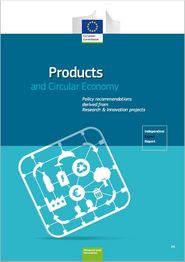EU-Report: Policy Recommendations for the Circular Economy
The circular economy is a concept that not only can help us reach climate neutrality and reduce environmental burden, but also support European economy to be innovative and competitive. The report “Products and circular economy“ presents the findings from more than one hundred EU-funded research and innovation projects, highlighting product circularity ideas related to design, manufacturing, use and afteruse. An independent expert report was compiled by the Directorate-General for Research and Innovation of the European Commission. IÖW scientist Dr Frieder Rubik contributed among nine independent experts to the identification of key lessons for policy makers with regard to possible future research and policy action.
Next to crosscutting recommendations the experts propose specific demand side as well as supply side recommendations. “One of our starting points is the recommendation that the Commission should develop an Integrated Circular Product Policy (ICPP) building on past lessons from Integrated Product Policy (IPP) that also takes account of the relationships with other policy fields”, explains Rubik. “In addition, it is important to intensify research on the relation between sustainable consumption/production and a circular economy, consumption patterns and the role of consumers, with the aim to break the link between consumption and resource use.”
Input for implementing the second Circular Economy Action Plan
These findings may help in the implementation of the second Circular Economy Action Plan, which develops a vision for an innovative circular material policy in the context of the ambitious climate mitigation objectives of the European Green Deal, and which has a landmark concept for a sustainable product policy framework at its heart.
++++++++++++++++++++++++
More information and Download:
European Commission (2020): Products and Circular Economy. Policy recommendations derived from Research & Innovation projects. Independent Expert Report. ISBN 978-92-76-16890-4, doi:10.2777/15587, Download PDF



